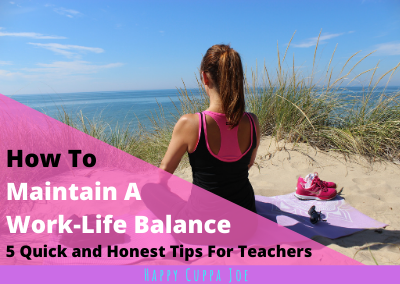“If you’re not working until 11:00 every night in your first year of teaching, you’re doing something wrong”.
As a student teacher in my last placement, and as an over-achiever (to a fault) this was by far the worst advice that a supervisor could have told me. Here I am, about to work with kids- each of whom is someone’s entire world- and now you’re telling me that I won’t be doing a good job if I don’t put in this kind of time? Oh what I would give to be able to get in touch with any of the other teachers that have been given this same, exhausting advice.
Now I’m not saying that there aren’t times that you need to put some extra hours in, these days are absolutely inevitable! (Spoiler alert… I’m writing this post at 12:25 am, after combing through tomorrow’s “Covid First Day” plan for about the ninth time to make sure I’ve covered everything!) But in a profession like teaching- where there is always more work that you can be doing- hearing that I wouldn’t be successful without putting in an extra 30 hours a week set me on a dangerous path to burnout.
It really wasn’t until I met Shaun and started sharing my life with him and his 3 kids that I really realized just how many overtime hours I had put into my job in my single years. I was working all hours of the night and convincing myself that it was necessary because I was doing it for the kids. I was forced to come up with a new way to balance my teaching career with my personal life- and I truly believe it saved me from burning out.
Here are the top 5 things I try to remind myself to balance this awesome work with my personal life:
1. Remind yourself that there is always more work to be done.
You need to find a system that works for you that lets you truly turn it off when you get home, rather than always looking for the next “to do”. For myself- I started a list on my computer of:
- To Do… Today
- To Do… This Week
- To Do… if I have time (at school!)
This also comes in handy as a quick reference when you have some extra help pop into your room and can make your prep times more efficient.
2. Collaborate as much as humanly possible!
Whether it’s unit plans, sub plans, sharing with your teaching partner, sharing with an online group, shopping tPt, you name it! Collaborate where you can and focus your valued attention on the foundational outcomes that matter and on making sure that your student’s emotional needs are being met. Don’t get caught up in feeling like going the distance on your own makes you a better teacher!
You know what makes you a better teacher? Not being too mentally exhausted to listen when your student’s need an empathetic ear…
3. Remember that your students may not remember what you taught them, but they will remember how you made them feel!
Yes, you want to plan with the end in mind and know where your lessons and units are going… but being planned out too specifically rarely ever goes as planned anyway, so stop worrying so far in advance about them!
4. Your abilities and performances as a teacher are not directly linked to the hours that you put in!!
Honest. There is always more to learn, we can always plan further ahead, we can always tweak existing lessons, we can always update our classrooms… the list goes on and on, and if you start to think that the more you work, the better teacher you are- you could be on a dangerous path to burnout.
5. Find a mentor, friend or a colleague to confide in.
I’m super lucky that I have my sisters who will firmly, but kindly tell me when I’m over-doing it. Find someone that you trust who will be honest with you and help you through the times that you may need to re-adjust your own work/homelife balance.
Or join our HappyCuppaJoe Facebook community- coming soon!
Conclusion:
Our jobs can be tough- and they can easily be all-time-consuming if you let them.
Especially in the first few years of teaching, this can easily turn into late nights and an unhealthy work-life balance. It can be easy to feel as though the extra work that you’re putting in is warranted, considering the important work that we do with all of these little people. Unfortunately, far too many teachers find themselves on a dangerous path to burnout in doing this.
Equally as important as figuring out your units and lesson plans is figuring out a healthy balance between work and your personal life.
Trust me, your students will thank you for it!
Micki Banks
Latest posts by Micki Banks (see all)
- Masters Portfolio - October 15, 2024
- Graduate Summative - October 15, 2024
- Expressive Therapies - October 15, 2024


